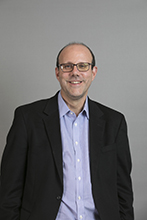Michael Kremer
(1964 - )

Michael Robert Kremer was born on November 12, 1964. His father, Eugene Kremer was the son of Jewish immigrants to the U.S. from Austria-Poland. His mother, Sara Lillian Kremer was a professor of English literature, who specialized in American Jewish and Holocaust literature. Her parents were Jewish immigrants to the U.S. from Poland.
He graduated from Harvard University (A.B. in Social Studies in 1985 and Ph.D. in Economics in 1992). He was a postdoc at Massachusetts Institute of Technology from 1992 to 1993, visiting assistant professor at the University of Chicago in Spring 1993, and professor at MIT from 1993 to 1999. Since 1999, he has been a professor at Harvard and, since 2003, the Gates Professor of Developing Societies.
Kremer has focused his research on poverty reduction, often as it relates to education economics and health economics. In one research project, for example, Kremer and his colleagues conducted field experiments in Kenya that showed that poor student achievement was not caused by scarcity of textbooks or hunger. They subsequently concluded that teaching methods were not properly adapted to students’ needs and that the quality of teaching improved if the instructors’ contracts were only renewed if they achieved good results.
Working with Abhijit Banerjee and Esther Duflo, Kremer helped establish the effectiveness of randomized controlled trials to test proposed antipoverty measures. The trio was awarded the Nobel Prize in Economics in 2019 “for their experimental approach to alleviating global poverty.”
Their findings, “have dramatically improved our ability to fight poverty in practice,” according to the Royal Swedish Academy of Sciences. Their fieldwork has also transformed the field of development economics.
In addition to the Nobel, Kremer has won numerous other awards. He is, for example, a Fellow of the American Academy of Arts and Sciences, a recipient of a MacArthur Fellowship and a Presidential Faculty Fellowship. He was also named a Young Global Leader by the World Economic Forum.
He is a research affiliate at Innovations for Poverty Action, a New Haven, Connecticut-based research outfit dedicated to creating and evaluating solutions to social and international development problems. Kremer is a member of Giving What We Can, an international society for the promotion of poverty relief.
He is founder and president of WorldTeach, a Harvard-based organization which places college students and recent graduates as volunteer teachers on summer and year-long programs in developing countries around the world.
He is also co-founder of Precision Agriculture for Development (PAD), a non-profit organization that leverages the global emergence of the mobile phone to provide digital agronomic advisory services to smallholder farmers at scale.
Kremer started the advanced market commitment, which focuses on creating incentive mechanisms to encourage the development of vaccines for use in developing countries, and the use of randomized trials to evaluate interventions in the social sciences. He created the well-known economic theory regarding skill complementarities called Kremer’s O-Ring Theory of Economic Development.
In 2000, Kremer, along with Charles Morcom, published a study recommending that governments fight elephant poaching by stockpiling ivory and so that they can proactively flood the market if elephant populations decline too severely.
In his widely cited paper, “Population Growth and Technological Change: One Million B.C. to 1990,” Kremer studied economic change over the last one million years. He found that economic growth increased with population growth.
He is married to Rachel Glennerster.
Sources: “The Prize in Economic Sciences 2019,” Press Release, Royal Swedish Academy of Sciences, (October 14, 2019);
“Michael Kremer,” Wikipedia;
“Michael Kremer,” Harvard University;
Brian Duignan, “Michael Kremer,” Encyclopaedia Britannica, (February 7, 2020).
Photo: Jon Chase / Harvard University.


